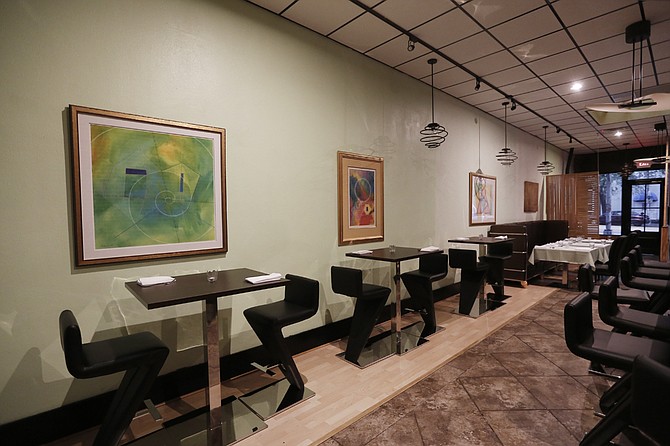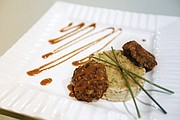Chef Larry Love opened raw-food restaurant Liquid Light Cafe in downtown Jackson in September 2015. Photo by Imani Khayyam.
Anyone who walks by downtown Jackson restaurant Liquid Light Cafe during the day may notice that the lighting is fairly dim, with sunlight spilling in through skylights. Opposite the bar is a pastel-green wall, accented mostly with geometric, brightly colored paintings.
The bar and tables are made from a dark, marble-like material, and most of the chairs are leather with chrome-colored structures. A green couch sits against a purple wall. Paper menus showcasing chef Larry Love's latest creations, including tomato tartar and falafel, sit at each place setting.
Liquid Light is Jackson's first raw-food restaurant, nestled in a space beside the Regions Plaza courtyard on Capitol Street.
Love opened the business in Clinton in October 2014 and relocated to downtown Jackson in September 2015. Though he says the concept has been slow to catch on, it's not stopping him.
He points to Mississippi's high rates of obesity and diseases such as diabetes as a reason Liquid Light should be in a place like Jackson. In 2014, the State of Obesity, a collaborative project between Trust for America's Health and the Robert Wood Johnson Foundation, reported that the current adult obesity rate in Mississippi is 35.5 percent, which is up from 23.7 percent in 2000 and 15 percent in 1990. The organization places the state at No. 3 among 51 states. For that same year, State of Obesity estimated that 13 percent of adults had diabetes.
"It might appear that it's quite audacious of us to think that this would be a viable business model in Jackson, Mississippi," Love says. "We have some relatively good evidence that it is. We aren't necessarily being overrun by diners. I don't think we ever expected to. We understood that the growth was going to be slow and organic. We haven't even bothered to do a grand opening, and we're not going to do one. We're not looking to be a flash in the pan."
Love says he stopped eating beef and pork after reading "Dick Gregory's Natural Diet for Folks Who Eat: Cookin' with Mother Nature" (Harper and Row Publishers, 1974). A few years later, he stopped eating chicken and fish. Although he can't remember all the reasons the book compelled him to start his journey as a vegetarian, he recalls Gregory asking readers to imagine a world where turkeys ate human beings.
"That just resonated with me," Love explains. "That just made sense. It seemed to me then, and it seems to me now that there's something just a little bit arrogant about eating other sentient creatures."
Around 2005, he read "Nature's First Law: The Raw-Food Diet" by Stephen Arlin, David Wolfe, Fouad "R.C." Dini, Marc Wolfe and Ken Seaney (Maul Brothers Publishing, 2003, $10), which he says resonated with him, too. After that, he began his journey as a raw foodist and then a live-food chef.
A raw-food diet, also called a living-food diet, consists of uncooked, unprocessed, mostly organic foods. The staples include raw fruits and vegetables, nuts and seeds, and sprouted grains. Love does not allow foods to go above 115 degrees, so while he doesn't use an oven, he does use kitchen appliances such as a blender, dehydrator or food processor.
"It is very much a way of life," Rebecca Turner, a registered dietician and the president of the Central Mississippi District of the Mississippi Academy of Nutrition and Dietetics, says. "The people who choose this diet, they can live extremely healthfully and thrive, but it takes a lot of dedication, a lot of thought process into maximizing nutrients from the foods you do choose to eat, but like all lifestyles, there's not one eating plan that's right or wrong for anybody, and it's good to experiment and to try different dishes."
Turner says that only 5 percent of Mississippians get their recommended servings of fruits and vegetables daily, so she likes the idea of a restaurant like Liquid Light Cafe.
"I think that the biggest things for places such as this to take root here in Mississippi is for Mississippians to expand their palate and to at least go try it," she says.
Love, who was born in Jackson, says that when he first started on his raw-food diet, he ate salads three times a day, which eventually got old. He can't recall where he first encountered the idea of being a live-food chef, but he says that when he got to culinary school in Chicago, he knew that he wanted to learn about that type of cooking. He graduated in 2006 from Cousin's Live Eatery Emporium and Education Center.
He also has a nutrition and wellness consultant certification from American Fitness Professionals and Associates.
While raw food shares some similarities with traditional culinary arts, Love says it is infinitely more labor intensive. For example, in conventional food preparation, if a recipe calls for mayonnaise, a traditional chef would just go get it from the cooler. Live-food chefs have to prepare it themselves.
"What it affords you is, I think, a better understanding of flavor profiles," Love says. "It tasks you with trying to achieve the same flavor (and) mouth feel that one would experience if the food were cooked."
Since starting Liquid Light, Love says, the menu hasn't been consistent, but for some customers, that's an added bonus.
"We're increasingly adding new items to the menu," he says.
The food Love serves, which is all vegan, often consists of deconstructed versions of familiar dishes. For example, the average person may be familiar with the fried version of a falafel or even a baked version, but the raw-food take on the dish is a little different. As opposed to using standard kitchen appliances, he uses a dehydrator to create the menu item. One interesting element of the dish is that the spices are more prominent than the traditional style.
That's one of the benefits of creating raw-food dishes, Love says. "That's one of the things that people rave about, even today, that when you eat live food, 'Well, now I taste the tomato. I taste the basil,'" he says.
Along with his regular menu, Love serves gluten-, dairy- and sugar-free desserts under the moniker The Cheesecake Solution. The primary ingredient in the mocha cheesecake is almond milk, which Love makes himself. He soaks the almonds in alkaline-ionized water for 12 hours to make them more digestible. The soaking also makes the skin easier to peel off. He blends a cup of almonds with three cups of water for five minutes and then strains it to separate the liquids from the solids. The restaurant uses the solids to make almond flour. The cheesecake also contains cashews (they have to be soaked for six to eight hours) and coconut oil.
With the exception of some ingredients such as coconut oil, the restaurant makes most products in-house, and to make sure that it stays almost entirely organic, Love says he will soon grow food for the restaurant on a half acre of land that he owns in Jackson.
"By this time next year, we want to be growing the vast majority of the produce that we use here," he says. " ... I don't think you can get much fresher than that."
He says the restaurant's objective, along with trying to provide a good dining experience, is to give the area something new to try. "Jackson needs Liquid Light Cafe," he says. "Jackson needs a Liquid Light Cafe. If you have aspirations of being an 'international city,' you have to provide a wide variety of experiences, dining and otherwise."
Liquid Light Cafe (224 E. Capitol St.) is open Tuesday through Saturday from 11:30 a.m. to 2 p.m., and 4:30 to 10 p.m. for dinner. The restaurant also serves brunch Sundays from 11:30 a.m. to 3 p.m. For more information, call 769-208-8689.



